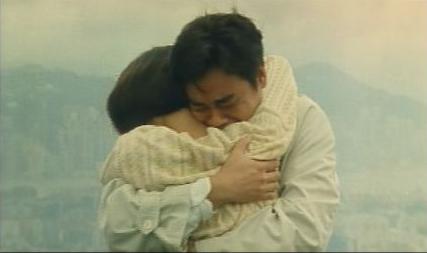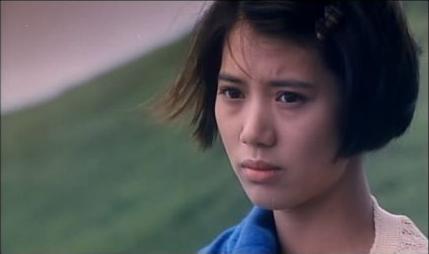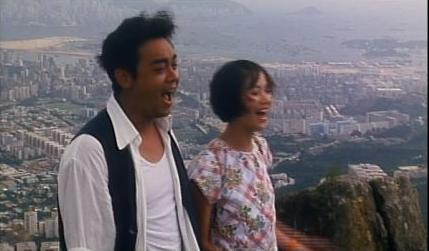October 21st, 2010
That’s Life, My Love

Lau Ching-Wan and Anita Yuen in C’est La Vie, Mon Cheri
With a few exceptions, it’s somewhat difficult to conceive of a scenario in which a person sees the absolute wrong movie at the wrong time in his or her lifetime. But conversely, it is wholly possible to pinpoint a moment in one’s life when the right film was seen at the right time — a movie that was not only good, but spoke to the viewer personally, perhaps even in reference to something that happened in their own lives sometime in the past or may have been happening at that very moment.
I’ve written previously on this site about how some of Wong Kar-Wai’s films have had just such an effect on me. While I’ve asserted that Wong Kar-Wai has his finger on the collective pulse of disaffected twenty/thirtysomethings everywhere, I also feel strongly that his films often prove to be particularly moving if seen at the right moment in one’s life — especially at a moment of transition or loss. But this is not a trait solely reserved for the cinema of WKW; I find this true of other films from other filmmakers as well. Despite differences in language, nationality, geography, and/or epoch, movies can be transcendent viewing experiences. Not to sound pretentious or sappy, but to me, this speaks to the very power of cinema, of literature, and of art — the power to move people.
Several weeks ago, I had the opportunity to watch Derek Yee’s 1993 film, C’est La Vie, Mon Cheri. I have been a fan of Yee’s directorial work for quite some time now, but this film — I’m embarrassed to say — was one of those movies that simply got away from me. Unless you’re just plain awesome like Kozo, there are very few people in this world who have seen every Hong Kong film that’s ever come out since the early 1980s. Whether we’re talking about movies or books or music, there are gaps in everyone’s knowledge, as “expert” as we might claim to be at times. I have no problem admitting that. Whether it’s missing out on Moby Dick or Bob Dylan or this award-winning Derek Yee film, we only have so much time to go around, so it’s bound to happen. But still, we persevere.
At the risk of spoiling the movie for those who still haven’t seen it (although I should note that all synopses I’ve encountered, including the back cover copy of the DVD reveal the film’s “twist”), the story is about a down-on-his-luck jazz musician named Kit (Lau Ching-Wan) who meets Min (Anita Yuen), a bubbly street opera performer who also happens to be a leukemia survivor. You might see where this is going.
In the past, we have reviewed several movies that fit a class of films that Kozo has dubbed the “Terminal Illness Tearjerker.” This odd subgenre usually involves a young, handsome man finding love with an impossibly beautiful young woman who just so happens to be cursed by some affliction that, by movie’s end, will claim her life. In an American context, Love Story (1970) would be the prime offender.
Some of these films have been good or at least passably entertaining, but others just seem like crass attempts to commercialize tragedy as a means to have a starring vehicle for two hot celebs. As a result, real-life experiences of illness and death are trivialized for public consumption. Still, I was less offended on those terms than you might expect. When it comes to genre pictures, there’s nothing wrong with formula, but it’s pretty tepid stuff when it’s missing the secret ingredient. It’s all the difference between having an ice cold glass of Coca Cola and sampling a lukewarm can of your average generic soda.

As those of you who read my blog know, my Dad was diagnosed with leukemia this summer. How would C’est La Vie, Mon Cheri affect me — would it move me, perhaps even more so than the average viewer, or would it be offensive and upsetting (fairly judged or not)?
To its credit, C’est La Vie, Mon Cheri was the winner of six Hong Kong Film Awards, including Best Picture, Best Director, Best Actress, Best Screenplay, Best Supporting Actor, and Best Supporting Actress. And after a first viewing, I have to say that there’s so much more going on with this film beyond the parameters of what a “Terminal Illness Tearjerker” might entail, which is really interesting considering that the film is presented in a seemingly unremarkable style of your average, 1990s era Hong Kong film. But looks can be deceiving, as C’est La Vie, Mon Cheri amounts to a good story, well told.
Among other things, the film explores what it means to follow your interests, damning the consequences. Kit is presented as a good jazz musician and songwriter, but his music has no place on the pop-centric tastes of Hong Kong’s current generation. If he stays true to his preferences, there’s little chance of making a good living in the industry. But if he alters his style, there’s the drawback of having to compromise one’s principles.
Similarly, we later learn that one minor character possessed dreams of being chosen by a famous opera troupe. But by the time she was an accomplished performer, that theater is no longer in business and the closest one in terms of prestige has no room for her. The best she can do is street opera, which entails performing for small change in front of a bunch of old-timers. But that’s what she wants to do. That’s her love.
In some ways, I can see the parallel to my own life. None of us here at LoveHKFilm.com are getting rich writing Asian cinema reviews — not Kozo, not Kevin, and certainly not me — but we do it anyway. Hong Kong cinema used to be the most vibrant, daring, and exciting national cinema on the planet. Now? — not so much. Like jazz and Huangmei opera, everything has had its heyday. Maybe Hong Kong will return to ascendancy in the future. Maybe not. But we’re not fair weather fans.
It’s the same with me choosing to be a writer and a professor, both jobs have a slim chance of obtaining untold riches. I’m not inventing Facebook or involved in any lucrative Wall Street shenanigans so my childhood dreams of a Batcave, complete with Shakespeare bust, secret passageway, and Batpole may be dimming fast, but I am following a different dream entirely — one that I find personally fulfilling.
In many ways, the film is about love, luck, and the convergence of talent and opportunity. It’s about knowing when to compromise and knowing when to stand your ground. And it’s never an easy call.
What really holds the film together are the leads. In a romance film, the casting is crucial.
On paper, Min is, if we are to use Nathan Rabin’s term, a Manic Pixie Dream Girl, the kind of chick who waltzes into the life of a disaffected male protagonist and changes his sad-sack life for the better with her effervescent charm and unbridled zest for life. But she’s much more than that. She comes across less like a plot device or a straight man’s ideal of a perfect girl. She’s three-dimensional — with faults and foibles along with the good qualities Kit falls for. Anita Yuen delivers a charming performance that proves her Best Actress award was well-deserved.
Lau Ching-Wan is, simply put, phenomenal here in simply grounding the film in a kind of reality that many romance films lack. He’s not trying to out-act anybody and he’s not doing shtick; he just allows his character to listen and react. When his initially hard-hearted character finally cracks a smile, it’s a welcome sight. Lau lost out to Anthony Wong’s less subtle performance in Untold Story. I wouldn’t say he was robbed, but it does feel like a pretty big oversight now seventeen years later.
For me, one of the iconic scenes of the film is an impromptu jam session involving Kit, Min’s elder saxophonist Uncle (Paul Chun Pui), and a retired Filipino Big Band group. By all rights, it should be cheesy as hell, but somehow, it isn’t. The scene actually amounts to an oddly moving movement, representing not only a crucial character beat for Kit, but sort of mirrors the film itself, as it takes the viewer to the same breezy, soaring heights as the characters. I can’t speak to whether I saw C’est La Vie, Mon Cheri at the right or wrong time in my life, but I can say it is a magnificent, low-key triumph that I think anyone would enjoy.



October 24th, 2010 at 3:32 pm
Just like you, C’est La Vie, Mon Cherie had eluded me for many years, and yesterday I finally sat down and watched it. I felt exactly the same as you, and I think that this is the way film should be when the actors inhabit the characters. Now i feel inspired to go back and watch some of my favorites again. I lost both my parents a few years ago, both after lengthy bouts with illness. I know it is not easy, but I also know how much my parents cherished the time with me whenever we spent all that time in hospitals and doctors offices. I wish you many days, and more good days than bad days.